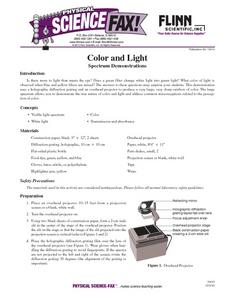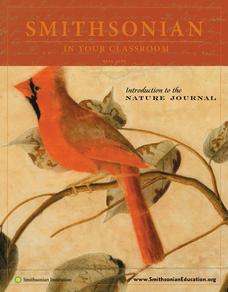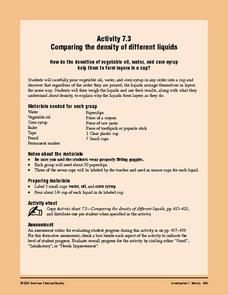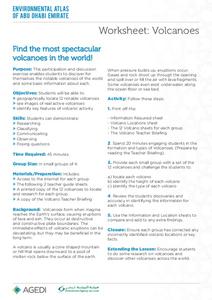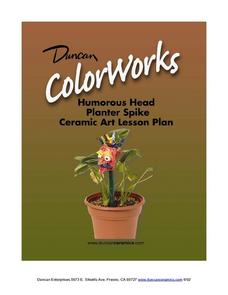Curated OER
Strong Descriptive Writing: James and the Giant Peach
Support your writers! Clear procedures and appropriate support make this a superb resource for elementary writing instruction. Ready your class to compose original descriptive paragraphs inspired by the episode in Roald Dahl's James and...
Center Science Education
Model a Moving Glacier
Glaciologists in your class make models of glaciers to simulate how they move down a valley, and then they use it to test any aspect of glacier movement. Not only is this a vivid visual of how these monsters of ice flow, but it is also...
American Chemical Society
Powder Particulars
By both demonstration and hands-on investigation, physical science fanatics come to know that some materials react when they come together. Adding vinegar to both baking soda and to baking powder, the difference between the two is clear....
Curated OER
Vivid Verbs
Young scholars explore parts of speech by collaborating in groups. In this verbs lesson, students examine several boring sentences with their class and define verbs which can spice the sentence up. Young scholars collaborate in pairs to...
Curated OER
Oxidation
For an introductory physical class, you can use these vivid activities to introduce learners to chemical reactions. Spontaneous combustion, melting and burning, tarnishing and rusting all are evidence that a chemical reaction has...
NOAA
Journey to the Unknown
What's it like to be a deep-sea explorer? Tap into the imaginations of your fifth and sixth graders with a vivid lesson, the second part of a six-part adventure. Learners close their eyes and submerge themselves in an expedition aboard...
Curated OER
Now You See Me, Now You Don't
Bioluminescence fascinates most upper elementary scientists. Display images of different glowing deep-sea organisms and discuss their environment. Young biologists then experiment with images and different colors of filtered light. In...
Curated OER
Color and Light Spectrum Demonstrations
Students explore the light spectrum. The teacher uses holographic diffraction grafting film on an overhead to demonstrate the true nature of color. After observing a vivid rainbow, students recognize that white light is composed of all...
Curated OER
Introduction to the Nature Journal
Students create nature journals. For this introduction to the nature journal lesson, students discover the uses of nature journals and begin their own. Students are challenged to use vivid, concise terms in their descriptive language....
Smithsonian Institution
A Ticket to Philly—In 1769: Thinking about Cities, Then and Now
While cities had only a small fraction of the population in colonial America, they played a significant role in pre-revolutionary years, and this was certainly true for the largest city in the North American colonies: Philadelphia. Your...
American Chemical Society
Comparing the Density of Different Liquids
Learners will like making a liquid layer cake to investigate the relative densities of various liquids: water, oil, and corn syrup. They will also introduce a few solid materials to find out how their densities compare. Standing alone,...
Environment Agency - Abu Dhabi
Find the Most Spectacular Volcanoes in the World!
Heat things up in your earth science class with this collaborative lesson on volcanoes. After first being introduced to the different types of volcanoes and how they are formed, young geologists work in small groups to...
Roy Rosenzweig Center for History and New Media
Labor Unions in an Industrializing U.S.
Have class members eager to enter the workforce? They'll be glad to learn that things aren't how they used to be. Have your young historians examine then discuss four primary source images related to the negative effects of...
Curated OER
The Black Prince at Crecy
Students analyze how artists have applied color relationships (value, intensity, tints, and shades, cool and warm colors) to create descriptive and expressive effects in artworks. They judge an artwork based on whether its organization...
Curated OER
Civil Rights in America
Seventh graders visit the Smithsonian and are shown different exhibits. They are to make their own drawing about one of the exhibits and write about the experience.
Curated OER
Borrowing Narrative Skills from Mr. Fletcher: Using a "Prompts in Reverse" Technique to Inspire Your Writers
Help your class find their writing voices with this lesson which uses the work of Ralph Fletcher to guide a "Prompt in Reverse" activity. Using the chapter "First Pen" from Fletcher's Marshfield Dreams, learners decipher what they...
Curated OER
Looking Into the Mirror
Students survey the impact of racial, cultural, and/or socio-economic intolerance in their own lives in relation to other individuals. They develop written and oral proposals to solve inequality and intolerance on a local, state,...
Curated OER
Humourous Head Planter Spike: Ceramics Lesson
What a great activity. Kids create humorous ceramic character (heads) spikes to enliven a planter. Modern art is full of expressive and exaggerated forms and your class gets to create them out of clay. This would be a lovely activity to...
Curated OER
American Flag History
Young historians explore US culture by investigating the US flag. They will use their textbooks, prior knowledge, and sources provided by the teacher to research the history of the American flag. They will design and create a trading...
Curated OER
Irish Eyes: Taking a Look at Local Landscape
Direct your class’s attention to the elements that make their community unique. After examining sample travel brochures, groups select something from their community to use as the subject, and then research, create, and publish a...
Curated OER
The Great Water Hunt
Students examine a globe to locate the bodies of water present and create a representation of those bodies of water for further exploration of the concept. Extensions of their observations are made at school, home, and the community.
Curated OER
VARVES: Dating Sedimentary Strata: Geology, Paleontological Patterns
Students count the number of varves (annual layers of sediment) in shale billets, taken from the Green River Formation in Wyoming. The count is then extended to reflect the entire 260 meters of sediments where the billets originated.
Curated OER
PRIMATE CLASSIFICATION: Evolution, Cladograms,
Students transfer examples (names) of primates from their location in an outline hierarchy of primate groups into a set of nested boxes reflecting that same hierarchy. A cladogram can then be drawn illustrating how these groups are...
Curated OER
Weather
Students design and create a structure that acts as a greenhouse and measure and record temperatures within the structure over a 24 -hour period, research global warming and answer the given discussion questions.
Other popular searches
- Vivid Verbs
- Vivid Action Verbs
- Strong Verbs
- Vivid Adjectives
- List of Vivid Verbs
- Vivid Descriptive Language
- Vivid Verbs for Said
- Vivid Details, Word Choice
- Strong Verbs Weak Verbs
- Using Vivid Verbs
- Vivid Verbs Powerpoint
- Vivid Language









